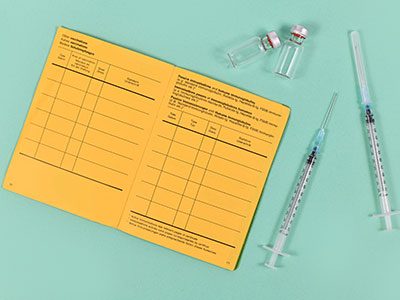Pediatric routine immunizations aim to protect children when they are most vulnerable to infections that can cause severe illness, hospitalization and even death. According to the American Academy of Pediatrics (AAP),your child should receive routine vaccinations throughout childhood and beyond.
Why does my child need so many immunizations when they are so young?
Certain diseases are more likely to cause severe illness in the youngest infants. For example, infections with rotavirus can make infants so sick with diarrhea that they may become severely dehydrated and require hospitalization. We recommend immunizing very young infants so that they are protected from serious illnesses that can land them in the hospital. This helps infants develop their immune systems so they are primed and ready to go in case they are exposed to these diseases later on
Why does my child need more than one of the same vaccine?
Studies have shown that children need multiple doses of the same vaccine to develop enough of an immune response to protect them from disease. This is why, for example, your child’s pediatrician or nurse practitioner will recommend multiple doses of the tetanus, diphtheria and pertussis vaccine. The good news is that we can combine multiple vaccines to decrease the number of injections that are needed.
Are vaccine side effects worse than getting sick with the diseases themselves?
Vaccine side effects are a sign that your child’s body is developing the expected immune response. The most common side effect is no side effects. Some children may develop redness, mild swelling or tenderness at the injection site, or cold-like symptoms that will go away within a few days. While many children have mild illness due to the diseases themselves, some children develop life-altering or life-threatening complications from vaccine-preventable diseases. For example, Hib meningitis can lead to lifelong hearing loss.
These diseases are rare; does my child really need a vaccine to prevent them?
Vaccine-preventable diseases are rare because of immunization. If you talk to your parents or grandparents, they are likely to remember vaccine-preventable diseases that were commonly feared when they were young, such as polio, which can lead to paralysis. We have also seen modern-day outbreaks of vaccine-preventable diseases, such as measles and pertussis, in communities with low rates of immunization. Unimmunized children are particularly vulnerable to infections when outbreaks occur.
Does my child really need the influenza (flu) and COVID-19 vaccines?
The flu and COVID-19 vaccines are updated each year to reflect the types of these viruses that will cause infections. This is why your pediatrician or nurse practitioner will recommend an updated vaccine for your child each fall. We know that these vaccines decrease the severity of these illnesses, which means that vaccinating your child will likely lead to fewer missed school and work days.
My child missed a vaccine dose; what do I do?
Talk to your pediatrician or nurse practitioner about getting catch-up vaccines to make sure that your child is up to date. Ask your pediatrician if you can schedule an immunizations-only appointment to get your child up to date quickly.
Who should I talk to when making decisions about vaccines for my child?
Parents and caregivers should always talk to a trusted pediatrician about what is right for their child. Pediatricians are always available to answer questions and support parents in decision making around vaccines.
To learn more, visit the AAP website for vaccine schedules for children 18 years or younger and other resources.
 https://riseandshine.childrensnational.org/wp-content/uploads/2026/01/boy-flexing-after-vaccine-feature.jpg
300
400
Rise and Shine
https://riseandshine.childrensnational.org/wp-content/uploads/2017/11/childrens_riseandshine_logo.jpg
Rise and Shine2026-01-20 16:52:102026-01-20 16:52:10What parents should know about childhood vaccines
https://riseandshine.childrensnational.org/wp-content/uploads/2026/01/boy-flexing-after-vaccine-feature.jpg
300
400
Rise and Shine
https://riseandshine.childrensnational.org/wp-content/uploads/2017/11/childrens_riseandshine_logo.jpg
Rise and Shine2026-01-20 16:52:102026-01-20 16:52:10What parents should know about childhood vaccines





















Where can I get a blank immunization card to have the Dr fill out? I am sick of having to go up there every year for a copy of shot records for school registration and family trips! I want an old school one that I can keep at home. Help!
You can download a printable immunization card at immunize.org: https://www.immunize.org/images/LifetimeCard.pdf